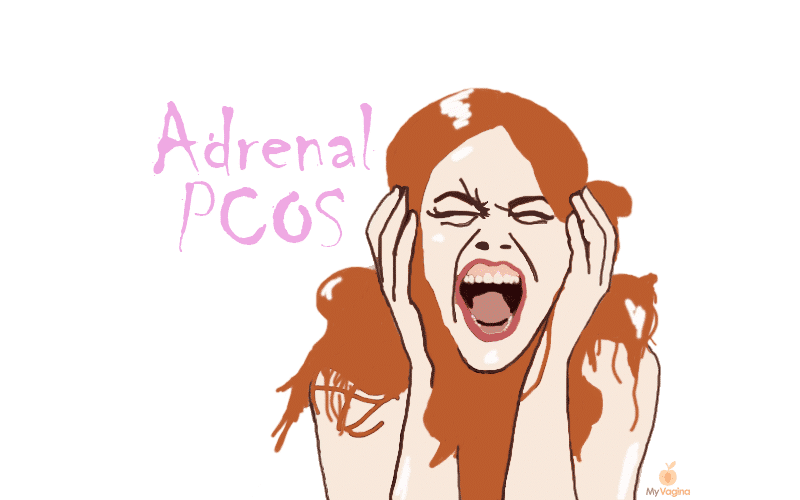Adrenal PCOS is a term used for some women with polycystic ovarian syndrome (PCOS) who don’t have high testosterone in their blood tests, but instead have high dehydroepiandrosterone-sulphate (DHEAS). This mouthful-of-a-word is a hormone produced by our adrenal glands.1
Both DHEAS and testosterone belong to the group of hormones collectively known as androgens, or ‘male-type hormones’.
These hormones are responsible for male-type characteristics such as facial hair growth and male-pattern balding. In women, a small amount of androgen is normal and beneficial, but a larger amount leads to PCOS and its related symptoms.
What is the difference between adrenal PCOS and regular PCOS?
Most of us are more familiar with testosterone as being the bad guy in PCOS. Testosterone production from the ovaries is commonly up-regulated in women with PCOS as a result of a deeper hormonal imbalance driven by a combination of genetics and lifestyle factors (e.g. diet, exercise and weight).2,3
PCOS is closely linked with insulin resistance, which ultimately leads to the stimulation of testosterone production from the ovaries. Sometimes, however, it is the overproduction of the adrenal-androgen DHEAS that are responsible for PCOS symptoms. This is commonly referred to as ‘adrenal PCOS’.4
What does DHEAS do?
DHEAS itself is an inactive hormone. It acts more as a reservoir from which testosterone and oestrogen can be made via conversion in the body’s tissues. This increases testosterone directly in the tissues, not in the blood, so you can have high tissue levels of testosterone that aren’t picked up in blood tests.5
High tissue levels of testosterone lead to symptoms like acne, oily skin, polycystic ovaries and lack of ovulation (resulting in infertility). High tissue testosterone also worsens insulin resistance, which means your ovarian testosterone production is also stimulated.
What causes elevated DHEAS in women with PCOS?
There are several causes of elevated DHEAS
- Researchers think genetics play a role in excess androgen production.
- High prolactin may be behind the overproduction of DHEAS. You can have this hormone tested in a blood test to see if it is high.
- High stress during puberty may also play a role, as may current stress.
- Remember, if you haven’t been diagnosed with PCOS, your elevated DHEAS may be due to other causes, such as congenital adrenal hyperplasia – make sure your options have been thoroughly investigated by your doctor.
Stress and adrenal PCOS
The main treatment for adrenal PCOS is to reduce stress.6 When we are stressed, our brain sends out adrenocorticotropic hormone (ACTH), which stimulates cortisol production from our adrenal glands.
Cortisol is the hormone that helps us cope with stress, but when ACTH acts on the adrenal glands, it also stimulates DHEAS production. This means that if we are chronically stressed, DHEAS is chronically stimulated. We also know that those with PCOS get more bacterial vaginosis (BV).
High cortisol acts on your hormones in many ways:
- High cortisol = low progesterone because progesterone converts into cortisol as needed (e.g. if you are stressed, you produce more cortisol)
- High oestrogen = low progesterone
- High progesterone = high thyroid hormone T2 (iodinase) = high metabolism
- Low progesterone = low T2 = low metabolism
- Low cortisol = normal progesterone, a natural anti-anxiety hormone
Strategies to reduce stress and stress hormones
- Decreasing your exposure to stressful situations (this may mean changing your job, friends or living situation, cutting down work hours, getting more sleep and releasing negative thoughts – yes, this means that thing you have been avoiding dealing with).
- Mindfulness meditation daily. The Smartphone app Smiling Mind is a good place to learn this but there are many options and lots of free options. Cost is not an excuse not to try. It only takes 5-10 minutes per day and has been demonstrated by science to reduce cortisol and adrenaline levels.
- Enjoying moderate levels of gentle exercise such as 30-60 minutes of walking, yoga, dancing or Chi gong, 3-5 times per week. Many women who exercise strenuously or every day experience interruptions to their menstrual cycle because it causes stress on your body and may result in low body weight. Over-exercising is not it.
- The herbal medicines rhodiola, withania, lemon balm (Melissa), and passionflower can be used alone or in a combination product to act directly on your stress response and reduce stress hormone levels.
In a clinical trial, drinking two cups of marjoram tea per day has also been shown to lower DHEAS in women with PCOS.7 This was a preliminary pilot study and the women in the trial did not have DHEAS levels above the normal reference range, however this simple, safe strategy is worth a go.
Use one heaped teaspoon of dried marjoram (preferably organic or home grown) in 250ml of boiling water, steep for 20 minutes with the lid on. Drink twice daily between meals for at least a month.
Finally, if your prolactin is high (hyperprolactinaemia), this can be reduced by taking the herb Vitex agnus-castus (chaste tree).8 Vitex should be taken every morning on an empty stomach, immediately after waking for 3-6 months. The recommended dose will be on the label, however you should investigate the strength of the product for therapeutic use in your situation.
Reducing stress and anxiety is a practice, not something that will just happen to you. You need your toolkit handy for when stress strikes, so you can prepare. If you have a presentation every month that makes you lose it, take some herbs and meditate for the week prior and see how much it changes how you feel. It might only be a marginal amount, but once you find what works best, you can skip the panic and get your presentation done.
If you are in a stressful situation that is beyond your control, taking herbs and practising meditation can really augment your response to the stress. Sometimes life throws you giant piles of crap and there’s only one way through it: forwards. You are not going to be less stressed, but you can help your body cope and not fall apart in the interim.
See a therapist, go dancing, write poetry, paint a picture, go under the rail bridge and scream when a train goes by. Don’t hold it inside unless you have to. These activities don’t change what life looks like, but they can change a little of what it feels like looking out your eyes at what’s going on.
Do what you need to do to stay sane. Prize your mental and emotional wellbeing!9
References
- 1.Goodarzi MO, Carmina E, Azziz R. DHEA, DHEAS and PCOS. The Journal of Steroid Biochemistry and Molecular Biology. Published online January 2015:213-225. doi:10.1016/j.jsbmb.2014.06.003
- 2.Baskind NE, Balen AH. Hypothalamic–pituitary, ovarian and adrenal contributions to polycystic ovary syndrome. Best Practice & Research Clinical Obstetrics & Gynaecology. Published online November 2016:80-97. doi:10.1016/j.bpobgyn.2016.03.005
- 3.Moran C, Arriaga M, Arechavaleta-Velasco F, Moran S. Adrenal Androgen Excess and Body Mass Index in Polycystic Ovary Syndrome. The Journal of Clinical Endocrinology & Metabolism. Published online March 1, 2015:942-950. doi:10.1210/jc.2014-2569
- 4.Yesiladali M, Yazici MGK, Attar E, Kelestimur F. Differentiating Polycystic Ovary Syndrome from Adrenal Disorders. Diagnostics. Published online August 24, 2022:2045. doi:10.3390/diagnostics12092045
- 5.Rosenfield RL, Ehrmann DA. The Pathogenesis of Polycystic Ovary Syndrome (PCOS): The Hypothesis of PCOS as Functional Ovarian Hyperandrogenism Revisited. Endocrine Reviews. Published online July 26, 2016:467-520. doi:10.1210/er.2015-1104
- 6.Papalou O, Diamanti-Kandarakis E. The role of stress in PCOS. Expert Review of Endocrinology & Metabolism. Published online December 7, 2016:87-95. doi:10.1080/17446651.2017.1266250
- 7.Haj‐Husein I, Tukan S, Alkazaleh F. The effect of marjoram (<scp>O</scp>riganum majorana) tea on the hormonal profile of women with polycystic ovary syndrome: a randomised controlled pilot study. J Human Nutrition Diet. Published online February 9, 2015:105-111. doi:10.1111/jhn.12290
- 8.Hamza A, AlBishri W, Alfaris M. Effect of Vitex agnus-castus plant extract on polycystic ovary syndrome complications in experimental rat model. Asian Pac J Reprod. Published online 2019:63. doi:10.4103/2305-0500.254647
- 9.Rao V, Pena A, James A, et al. The role of meditation and mindfulness in the management of polycystic ovary syndrome: a scoping review. Front Endocrinol. Published online May 16, 2024. doi:10.3389/fendo.2024.1295705







